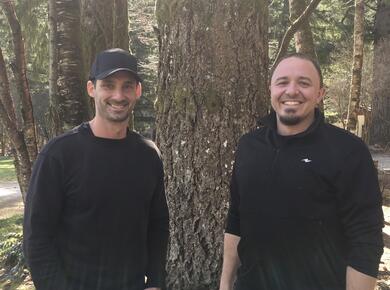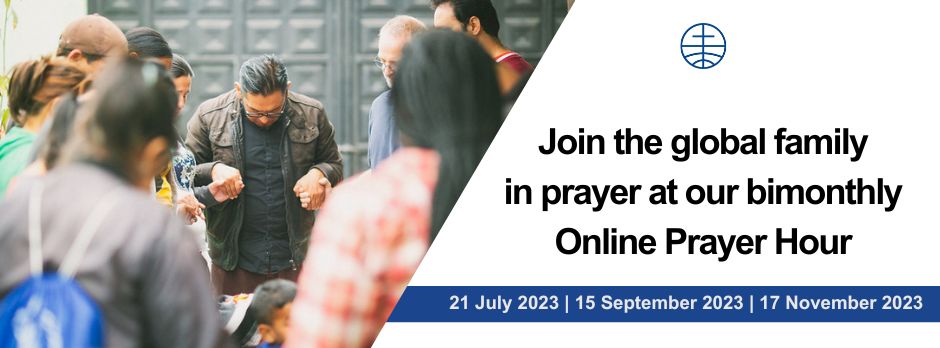Posted: June 8, 2023
“Your textbook worked!” Darnell Barkman told his former professor Lisa Schirch after floodwaters overcame his region in November 2021. The pastor at Yarrow United Mennonite Church in B.C., Canada, implemented all his peacebuilding training to coordinate disaster response.
For the last several decades, the poorest parts of the global church have been impacted by climate change directly, her students learn. “Now, climate change is coming to our front door in North America. Our money and resources are clearly not enough to protect us from disaster,” Darnell Barkman says.
But when the storm affected his neighbours, Darnell Barkman’s training in peacebuilding planning and conflict assessment equipped him to coordinate an inter-church community response.
Disaster response follows similar steps to armed conflict, Darnell Barkman explains. First, you need a ceasefire, then you do an assessment, clean up the mess, and rebuild.
In November 2021, the region surrounding Yarrow was covered by floodwaters from excess rainfall. Then, the dike breached, cutting off the town from transportation routes in and out.
For a time, the Yarrow churches were disaster response centres. The pastors had connections to people and the churches had space. Partners like Mennonite Central Committee and Mennonite Disaster Services had expertise to share.
In times like these, the church can have a role like no one else, says Darnell Barkman. “We exist in the midst of diversity and differences. We’re together because of God’s love and we’re open to serve because it’s part of who we are.”
“Different gifts within the congregation came into play,” says Josh Kraubner, Connections pastor at Yarrow Mennonite Brethren (MB) Church. Some cook, some do heavy labour, some make phone calls, some have tools and equipment, some have organizational ability to see the bigger picture.
Darnell Barkman’s guiding principle in the midst of the crisis was “minimum viable structure.” When people needed sandbags, the Mennonite church lot was a place to fill them. Later, when people needed a place to dump ruined goods in the clean up efforts, the MB church parking lot became a transfer station. With a plywood sign marked “dump here” and a bit of supervision, the community saved dozens of trips to a far away landfill.
City officials trusted the team of pastors to do the necessary organizing in the community.
“This is so good!” Josh Kraubner recalls thinking as he walked past the MB church kitchen full of people serving shoulder to shoulder: ladies from the Mennonite church, the Reformed church, the Alliance church and volunteers from host congregation. “We can put aside our little differences so we can serve our neighbours.”
At one point, the ad hoc inter-church collaborative response was so inundated with volunteers, they had to turn people away – or direct them to assist the other organizers who were not connected into the church networks.
After the flood, some community members see the church differently.
“When church is engaged with other non-church organizations in community development, the community has the opportunity to see a group of neighbours working to make the community a better place with church as participant in it,” says Darnell Barkman. “This removed some of power dynamics… We were shoulder to shoulder with everyone else.”
“If we maintain [relationships built during the flood response], we’re going to see where God is creating opportunities – that are not based around emergency – for the church to work alongside the city for the blessing of the region,” says Darnell Barkman.
It has shown Josh Kraubner a taste of what disaster looks like behind the news stories. “It made it very real,” he says. Now when he hears about a disaster in another part of the world, he think, “I know a little bit about what’s that’s like... This is traumatic and hard.”
Another long-term impact of the flooding has been the reinvigoration of the ministerial group. Pastors from different denominations meet regularly again.
More than a year after the waters receded, for some, recovery appears to be over. But alongside the lingering trauma of the moment, the relationship stresses and financial stresses remain. For others, the rebuilding is nowhere near complete.
After Mennonite World Conference sent out a prayer call (see “A pastoral letter for Anabaptist-Mennonites in British Columbia”), Darnell Barkman received encouragement from around the world. He was amazed that “with children working in mines and generations of armed conflict, here’s a pastor from DR Congo sending me a prayer through Google Translate saying ‘we’re praying for you’!”
It struck him as an image out of John’s Revelation. “We are living in a time when MWC can call a global prayer meeting and we have tribes and tongues of every nation (Revelation 7:9) on the screen,” Darnell Barkman said.
And was an example of the need to shift perception of power in the global church. “There’s a perception of us having the money, and we send to help. But, spiritually we don’t have all the resources. We control those things that we can control… but there is so much more power and spiritual authority in global church that we need to learn to receive better.”
A pastoral letter for Anabaptist-Mennonites in British Columbia |
Prayer |


Comments: